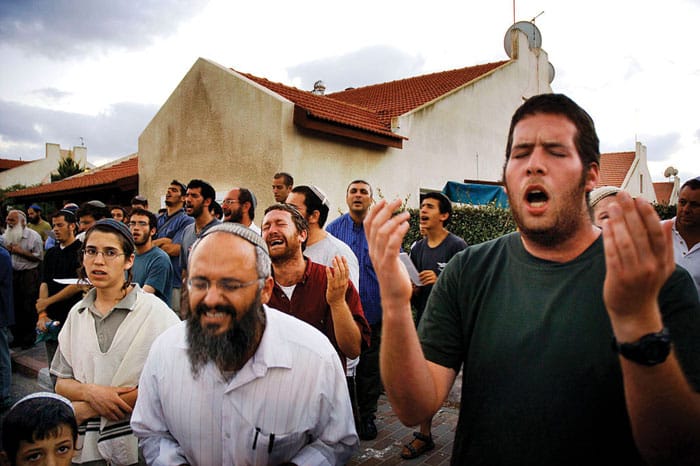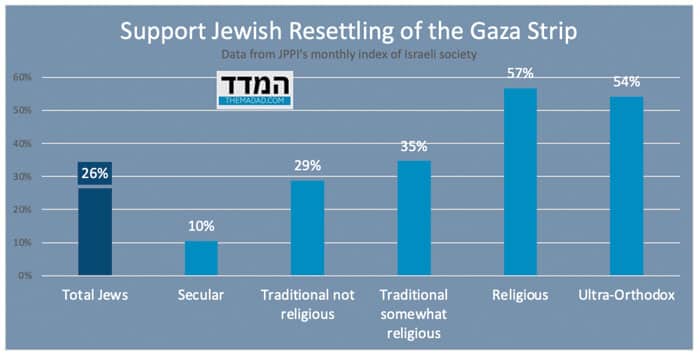
Let’s start by stating the obvious: Israel is not about to resettle Gush Katif or restore any of the other Jewish settlements that were evacuated from the Gaza strip in the 2005 pullout. At least not any time soon. And if you don’t trust me on this one, just listen to Prime Minister Benjamin Netanyahu, who has said several times that this is an “unrealistic idea.”
Last Saturday, in a press conference, Netanyahu reminded his audience that settlement policy is set by the cabinet, not in conferences of activists. The international court in The Hague might have been on his mind as he felt compelled to make such a clarification. The court has taught us that inflammatory statements by a minister or a Member of the Knesset is material that can be utilized by prosecutors to hammer Israel. A vow to return to Gush Katif will surely give the court a reason to rule against Israel. And of course, you could say that the court is not important, and who cares. But it turns out that trashing the court is one thing, and ignoring it is quite another. Netanyahu’s rightwing government does not intend to resettle Gaza, no matter what some of its ministers say.
A “return to Gush Katif” conference was held on Sunday in Israel, in which a few government ministers and MKs participated. For obvious reasons, it raised the alarm, even horror, of some Israelis and many outsiders. But this was not a conference of actions, it was a conference of statements. And there were two types of statements featured. First there was the talk of dreamers, or visionaries, call them whatever you want, whose real purpose is to preserve a dream for future implementation. They want the return to Gush Katif to be a “next year in Jerusalem” type of dream, or a “may Beit HaMikdash be rebuilt” type of dream: something they truly aspire to, and hope will one day be fulfilled. The second type of statement is the talk of politicians. They came to the conference to make their rounds and garner support.
Who wants to return to Gush Katif? It is important to say that there are more than a few such Israelis. How many of them intend to actively settle the area, that’s another question. How many of them would regret such a decision when it turns out that their children must go and defend the settlements inside Gaza, that’s another question. But at least as a programmatic statement, about a quarter of all Jews in Israel want the Gush Katif bloc to be rebuilt: 26% in the Jewish People Policy Institute survey of January, 24% in the November 2023 survey.
All supporters of such a move are coalition voters (only 3% of opposition voters want a return to Gush Katif). One-third of Likud supporters want this, eight out of ten supporters of the Religious Zionism party want this. In fact, almost all supporters of this impractical idea are religious or ultra-Orthodox. That is, the majority of the religious and the majority of the ultra-orthodox want full Israeli rule over Gaza and the return of the Jewish settlements. And, as the age demographic decreases, the desire to settle the block increases. In other words, young Orthodox Israelis pursue a dream that most other Israelis dread, and most non-Israelis might consider a crime.
The religious and ultra-Orthodox are also the main supporters of opening a second front against Hezbollah in the north. And of course, the case of the ultra-Orthodox is especially interesting: these are youngsters who would not do the fighting, as they are exempted from military service. When they are asked whether an equal share of the security burden is an ideal they believe in, their answer is no. And yet, they are trigger-happy as they come on settlement policies and war in the north.
Some ideals are hard to forget and leave behind. If the Palestinians think they are the only ones who can entertain kooky dreams involving going back to places that were abandoned long ago – here’s a surprise. Jews can also entertain such dreams.
What can we learn from the short-lived drama of the Gush Katif conference? Two things of great importance. One: that some ideals are hard to forget and leave behind. If the Palestinians think they are the only ones who can entertain kooky dreams involving going back to places that were abandoned long ago – here’s a surprise. Jews can also entertain such dreams. Two: that while Israelis attempt to convince themselves that their post-October-7 state of mind is one of a more unified, pragmatic, hard-nosed approach to policies – the reality is quite different. Many of the pre-October-7 disagreements, including the one involving a more expansive vision of where exactly Israel begins and where it ends, are still with us. These disagreements manifested themselves in this eruption of a pointless debate about the rebuilding of Gush Katif. These disagreements might return to bite our backsides, with vengeance.
Something I wrote in Hebrew
This was written based on a new Pew report on language, traditions and national identity.
The final product of this study is a ranking of all countries, an Index of National Identity. The score is from 0 to 4, where a higher score means a more rigidly defined national identity. If in a certain country all four parameters (language, birthplace, traditions, religion) were to receive a score of 4, then the average would be 4. Indonesia comes closest to this, with a score of 3.72. Israel is somewhere in the middle, with a score of 2.86. This is especially interesting for those who think Israel is a country with a very clear, or defined, or rigid national identity, or for those who believe that Israelis all interpret Israeliness rigidly. Here is proof: this is not the case.
A week’s numbers
See above column to understand what the debate over Gush Katif means:

A reader’s response:
Shmuli Pasternak writes: “I don’t understand why UNRWA is still allowed to operate in areas controlled by Israel.” My response: 1. International hypocrisy. 2. International incompetence. 3. International ignorance.
Shmuel Rosner is senior political editor. For more analysis of Israeli and international politics, visit Rosner’s Domain at jewishjournal.com/rosnersdomain.






















 More news and opinions than at a Shabbat dinner, right in your inbox.
More news and opinions than at a Shabbat dinner, right in your inbox.